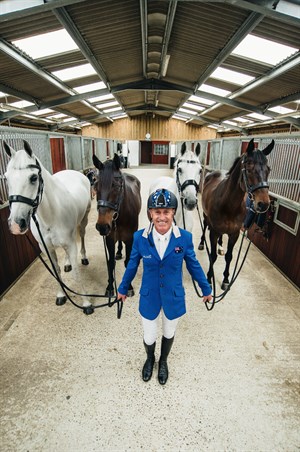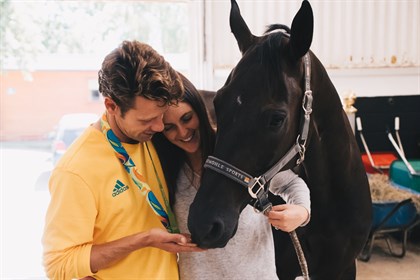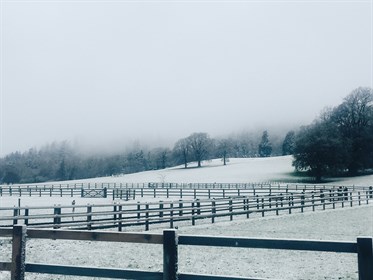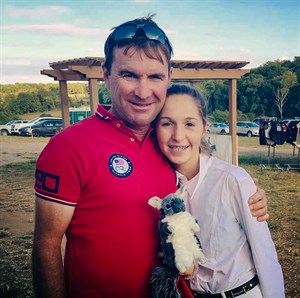

Andrew Hoy at home with his team of 4* horses in the U.K.
With WEG starting next week, we thought we’d look back on an article from the archives to look at three Aussie eventers, or past in the case of Phillip Dutton who have made the move overseas.
Chris Burton and Andrew Hoy will be representing Australia at the upcoming World Equestrian games in Tryon which commences on the 11th of September. Ex-Aussie Phillip Dutton will be representing the U.S. with Z, the 10-year-old Zangersheide gelding.
CHRIS BURTON
Chris, Bek and Santo spending a moment together post-Rio.
© Chris and Bek Burton
Where were you based before moving?
In the Hawkesbury near Sydney.
Why did you move to the UK? Was it to better your chances of making the Australian team for the London Olympics?
I think you have just as much chance of being selected and performing as well whether you are based in the UK, US or Australia. I moved for personal reasons, it just worked out well that the Olympics were in London the next year.
What is the UK able to offer that Australia can’t?
Bad food and worse weather! Beyond that, England is the hub of eventing. Being based here makes it easy to go to the continent. You are able to enjoy big events weekend after weekend.
What was the hardest thing about leaving Australia?
I had a successful team of eventing horses and a good reputation, and I was worried I would lose all of that. It is also very tough leaving your friends and family.
What support network did you have when you moved?
I looked at America as well before I decided on England. When I came over here I ran into a friend, Sam Griffiths, who had a barn of stables available to rent. That was the best decision I made. Sam and Lucy were so generous in their advice and helped guide me towards the right program. They were a big part of me getting on my feet so quickly.
How did you go about building a team overseas?
This was one of the toughest things to start with. I arrived with five horses that quickly became six and I had no help initially. I had a groom in Australia who was meant to come with me but circumstances changed and he couldn’t come. It was tough to begin with but I quickly built up a support network.
How does equestrian sport differ between the UK and Australia?
The sport itself is exactly the same. There are top riders and events all over the world. Because the UK is such a hub for internationals, the only real difference is that it is on a larger scale.
How did you adjust to the change in weather?
To be honest, I learned a new respect for British-based eventing riders, because trying to prepare your horses at the start of the season in January-March is near to impossible. They are boxed up and full of energy, and if you are lucky enough for the arena not to be frozen, it will likely be raining instead. We are torn between not working them too hard in the early season and working them hard enough to get the buck out!
Englan's cooler climate has taken some getting use to for both Chris and Bek.
© Chris and Bek Burton
Did you bring any horses with you from Australia?
Yes, I was very lucky to have owners support me and helped me bring five horses over here. It was a huge leg-up to land here with such a strong team.
What do you miss most about Australia?
Family, friends and the weather. We go back every year when the eventing season ends here in October.
What tips do you have for young, aspiring riders who want overseas experience?
By all means go and see it, but I think you can be just as successful based in Australia. Success is not about where you are based but how hard you work and not taking your eye off the ball.
PHILLIP DUTTON
Phillip Dutton and his daughter.
Where were you based before moving?
I grew up about 40 miles outside of a small town called Nyngan in NSW.
You moved to the US in 1991 to train in a more internationally competitive environment and prepare for the Atlanta Olympics. Why did you stay? Or was that always the plan?
I didn't have any great master plan. Bruce Davidson helped find a place to be based from. I quickly realised that staying for a year was a very short time. I liked the area, felt it would be a great place for my career, plus I met Evie!
Besides a more competitive environment, what does the US offer that Australia doesn’t?
There are a lot more opportunities to acquire owners in the US. The country is much older and established in wealth, so that's an advantage. The competitions are maybe a little stronger than in Australia but not as strong as Europe.
What was the hardest thing about leaving Australia?
It was tough leaving Australia really not knowing anyone in the US and having no back-up plan.
Was it a difficult decision to become a US citizen in 2006?
Changing my nationality to ride for the US was about the hardest decision I’ve ever had to make. I still remember dreading making the phone call to my parents. Also, telling my mentor and coach Wayne Roycroft at the end of the world champs at Aachen was hard.
What support network did you have? How did you go about finding a property initially?
Bruce Davidson had kindly organised a farm for me to keep a horse in exchange for work. It was a bit of a leap of faith.
How did you go about building a team overseas?
I had no connections here at all, so I just tried to meet people and started very, very slowly teaching people. I also got to know a big race trainer in the area, Michael Dickinson, who I ended up getting a lot of breaking and problem horses to train. I also rode in two flat races for him.
You took one horse with you, True Blue Girdwood. How did you acquire new horses and rides in the US?
The hardest part was getting people interested in owning horses. I tried to get people involved and to make it fun to be a part of the sport. But it’s very slow to build. The sport’s bigger now in the US so I think it’s easier to attract people now.
How does equestrian sport differ between the US and Australia?
I think the sport is a bit bigger here than in Australia now with some events making decent profits and part of it being passed on in prize money.
What do you miss most about Australia?
Australians generally have a much more laid-back attitude than Americans, which I miss. Having (Australian-born) Boyd Martin and Ryan Woods around helps keep everything pretty light-hearted. We come back every year or two. It’s getting harder to mesh everyone's schedules, though, as our girls get older.
A lot of younger riders aspire to gain experience in Europe. Can America offer the same opportunities?
The competition standard in Europe is much higher than the US. I would say it’s easier to make a living here, especially with teaching.
How do you believe the sport differs between UK/Europe and the US?
I think traditionally most of the top riders in the world have based themselves in England. It’s changed a bit now with Germany being so dominant over the last six to eight years with most riders living in Germany. France has also made a resurgence with mostly home-based riders.?
What tips do you have for young, aspiring riders who want overseas riding experience?
I encourage aspiring riders to try to be around great role models… people, riders and coaches and such that are the best and aim to emulate them.
ANDREW HOY
Andrew Hoy at home with his team of 4* horses in the U.K.
Where were you based before leaving for the UK?
Where I grew up at Culcairn in the Riverina region of NSW.
Why did you move to the UK permanently?
Because I wanted a true evaluation of where I stood in the world. I wanted to place myself with the top riders in the world, where the level of competition was very high and where there were a great number of riders competing at events, so that I wasn’t getting a false sense of security as to where I was. To be able to travel throughout Europe is relatively easy and is much easier now than when I first came across. And when I first moved, the UK was the hub of the sport.
How long have you been living in the UK?
I’ve been here since 1993, which is when I took up the sport full-time. My success at the 1992 Olympics was the impetus for me deciding to ride full-time and then it took until 1993 to sort out my UK visa.
What was the hardest thing about leaving Australia?
The hardest thing was leaving behind the support team you’ve developed; so you can actually make it onto the international scene. You leave all that behind. Also, if it goes wrong and it doesn’t work, you are alone. In Australia I could have easily gone back to farming if things didn’t work out, but in the UK I had to make it work, I had no option.
Did you have a support network in the UK to help you make connections?
I had developed quite a strong support team prior to moving. I had a vet and farriers that I had already been working with. I had also worked closely with Mark Phillips in relation to coaching, because I had been based with him and the Princess Royal for the previous two years when travelling in and out of the UK. In Australia, your support team is quite often family, or if not, people who you have been working with for some time to help you make the international circuit.
How difficult was it to build up the team of incredible horses you have in the UK?
It always is difficult, and becoming more so as the years go on. The British have tremendous funding from the lottery funding, and the results can be seen on the medal tally – look at the British medal tally at the last Olympics in relation to Australia to see how strong they are. Australia used to be incredibly strong, but where did we finish this time around? The UK is incredibly strong in their sporting success, albeit not in the eventing, although they should be. Great Britain has not won a gold medal in eventing since 1972.
How does eventing differ between the UK and Australia?
Sheer numbers! I recently rode at a basic ODE where there were 600 advanced horses competing. It isn’t that there aren’t good riders or horses in Australia, but the sheer mass of numbers competing in Great Britain makes a huge difference.
Do you think it helps keep you in check with where you’re at with your riding?
For sure. You go to Badminton and Burghley and there are a lot of competitors. At Burghley this year there were 77 starters, but in Adelaide there may only be 14 starters. It’s not that the Adelaide competition isn’t a good event, but there isn’t the breadth of riders with 14 starters – and they are predominantly Australian, with just one British rider. At Burghley, with 77 starters, there are 12 nations competing. It’s just different.
Have you had to change how you care for your horses in the UK?
Climatically I didn’t change anything in caring for my horses, but since 1993 the care of my horses is far greater, purely because of our knowledge and how far science, and the sport and industry have moved forward. I look back to a dressage test I rode in the Sydney Olympics on Darien Powers when I was part of the gold medal team in 2000 and I produced the lowest score ever given for a 4* test! I look at that performance now, and the way the horse is and the way I was riding, and it is so far behind where I’m riding today. The sport has moved on enormously in terms of the riding, the quality of horses and what the horses have been asked to do.
Did you take any horses with you to the UK?
Yes, I had Kiwi, who I rode in the 1992 Olympics and bought from New Zealand.
What do you miss most about Australia?
I really miss my friends. I have a lot of friends outside of the equestrian industry in Australia and I miss seeing them.
Top tips for young riders?
If you want to be successful, it’s just hard work. What have I sacrificed? I don’t believe I’ve sacrificed anything, but I haven’t been able to do certain things because I’ve made the decision to be a rider. To be a top athlete you are not normal. Normal is working 9-to-5, being free on the weekend, having four weeks holiday, superannuation and being employed by someone. Yes, I live away from my immediate family, but it’s very easy to communicate with my parents who I speak to on a daily basis.
You’re very good at returning to Australia…
Yes, I’m disappointed that I’m only back once this year in November as I do enjoy being in Australia.
READ THE LATEST NEWS ARTICLES HERE
https://www.equestrianlife.com.au/articles/The-world-awaits_


